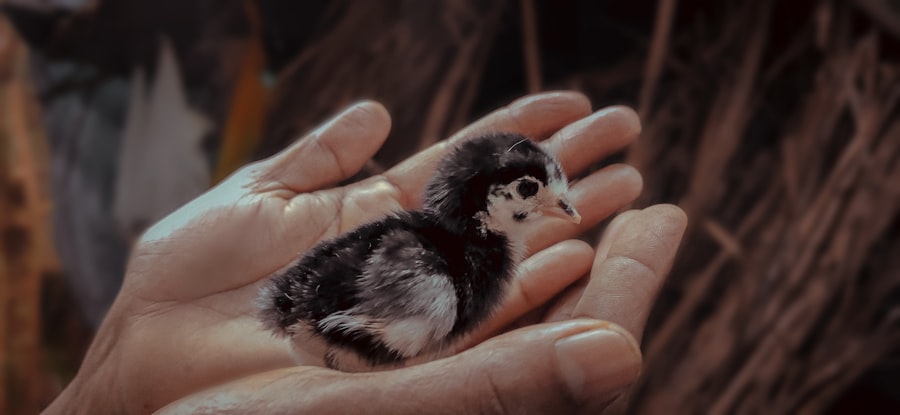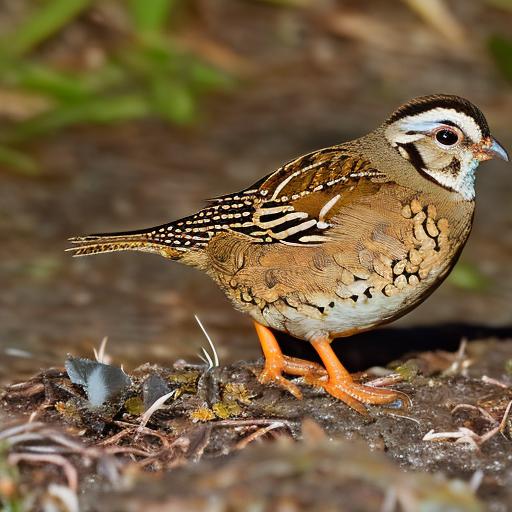Baby quail chirping is a common behavior among young quails. Chirping is a form of vocalization that is used by baby quails to communicate with their parents and siblings. It is a natural and instinctive behavior that helps them to stay connected with their family members and to express their needs and emotions. The chirping sound is typically high-pitched and can vary in intensity and frequency depending on the situation. Baby quails may chirp when they are hungry, thirsty, cold, scared, or in need of attention. They may also chirp to establish their presence and to locate their family members. Understanding the reasons behind baby quail chirping is essential for providing them with the care and attention they need to thrive.
Baby quail chirping can also serve as a form of bonding and socialization among siblings. It helps them to stay connected and to navigate their environment together. Chirping can also be a way for baby quails to express their emotions and to seek comfort from their parents and siblings. As they grow and develop, baby quails may use chirping as a way to establish their place within the family hierarchy and to communicate with other members of their group. Overall, chirping is an important form of communication for baby quails and plays a crucial role in their social and emotional development.
Key Takeaways
- Baby quail chirping is a form of communication and can indicate various needs or emotions.
- Reasons for baby quail chirping include hunger, thirst, discomfort, loneliness, or fear.
- Respond to baby quail chirping by checking for basic needs such as food, water, warmth, and companionship.
- Calm a chirping baby quail by providing a comfortable and secure environment, including proper bedding and temperature control.
- Potential health issues related to baby quail chirping include injury, illness, or stress, and should be addressed promptly by a professional.
Reasons for baby quail chirping
There are several reasons why baby quails chirp, and understanding these reasons is essential for providing them with the care and attention they need. One common reason for baby quail chirping is hunger. When baby quails are hungry, they will chirp to signal their need for food. This is a natural instinct that helps them to communicate with their parents and siblings and to ensure that they receive the nourishment they need to grow and develop. Another common reason for chirping is thirst. Baby quails will chirp when they are in need of water, signaling their need for hydration.
In addition to hunger and thirst, baby quails may also chirp when they are cold or scared. Chirping can be a way for them to seek warmth and comfort from their family members or to alert them to potential dangers in their environment. Baby quails may also chirp when they are in need of attention or companionship, using vocalization as a way to connect with their parents and siblings. Understanding the reasons behind baby quail chirping is essential for providing them with the appropriate care and support they need to thrive.
How to respond to baby quail chirping
When responding to baby quail chirping, it is important to first identify the underlying reason for their vocalization. If the baby quails are chirping due to hunger, it is important to provide them with a nutritious diet that meets their nutritional needs. This may include feeding them a diet of high-quality game bird starter feed, supplemented with fresh greens and insects. Ensuring that they have access to clean water at all times is also essential for addressing their thirst-related chirping.
If the baby quails are chirping due to cold or fear, it is important to provide them with a warm and secure environment. This may involve adjusting the temperature in their brooder or providing them with additional bedding or heat sources to keep them comfortable. Providing them with hiding spots or shelters within their enclosure can also help to alleviate their fears and reduce excessive chirping.
If the baby quails are chirping in need of attention or companionship, it is important to spend time interacting with them and providing them with social enrichment. This may involve handling them gently, talking to them softly, and providing them with opportunities for socialization with their siblings. Responding to baby quail chirping in a timely and appropriate manner is essential for ensuring their well-being and promoting healthy development.
Tips for calming a chirping baby quail
Calming a chirping baby quail requires patience, observation, and understanding of their needs. One effective way to calm a chirping baby quail is by providing them with a comfortable and secure environment. This may involve ensuring that their brooder or enclosure is free from drafts, predators, and other potential stressors. Providing them with appropriate bedding, heat sources, and hiding spots can help to create a sense of security and reduce excessive chirping.
Another tip for calming a chirping baby quail is to provide them with opportunities for socialization and enrichment. This may involve introducing them to new toys, perches, or natural materials within their enclosure to stimulate their curiosity and provide them with mental stimulation. Spending time interacting with the baby quails and providing them with gentle handling can also help to alleviate their stress and reduce excessive vocalization.
Additionally, ensuring that the baby quails have access to a balanced diet, clean water, and appropriate environmental conditions can help to address any underlying reasons for their chirping. Monitoring their behavior and vocalization patterns can also help to identify any potential health issues or stressors that may be contributing to their excessive chirping. By taking proactive steps to create a comfortable and enriching environment for the baby quails, it is possible to calm their chirping and promote their overall well-being.
Potential health issues related to baby quail chirping
Excessive baby quail chirping can be indicative of underlying health issues that require attention. One potential health issue related to baby quail chirping is nutritional deficiencies. If the baby quails are not receiving a balanced diet that meets their nutritional needs, they may chirp excessively as a way of signaling their hunger or discomfort. Ensuring that they are receiving a diet of high-quality game bird starter feed, supplemented with fresh greens and insects, can help to address any potential nutritional deficiencies that may be contributing to their excessive chirping.
Another potential health issue related to baby quail chirping is respiratory infections or other illnesses. If the baby quails are chirping excessively and displaying other symptoms such as lethargy, difficulty breathing, or discolored droppings, it is important to seek veterinary care promptly. Respiratory infections can be common in young quails and can lead to serious health complications if left untreated. Monitoring the baby quails for any signs of illness or distress can help to identify potential health issues early on and ensure that they receive the appropriate care.
In addition to nutritional deficiencies and respiratory infections, stress or environmental factors can also contribute to excessive baby quail chirping. Ensuring that the baby quails have a comfortable and secure environment, free from potential stressors such as drafts, predators, or overcrowding, can help to reduce excessive vocalization and promote their overall well-being. By monitoring the baby quails for any signs of distress or illness and addressing any potential health issues promptly, it is possible to ensure that they thrive and grow into healthy adult quails.
Creating a comfortable environment for baby quail

Creating a comfortable environment for baby quail is essential for promoting their well-being and reducing excessive chirping. One important aspect of creating a comfortable environment for baby quail is providing them with appropriate housing and bedding. This may involve setting up a brooder or enclosure that is free from drafts, predators, and other potential stressors. Providing them with clean bedding, such as pine shavings or straw, can help to create a comfortable and secure environment for the baby quails.
Another important aspect of creating a comfortable environment for baby quail is ensuring that they have access to appropriate heat sources. Young quails require consistent warmth in order to thrive, so providing them with heat lamps or heating pads within their brooder can help to maintain an optimal temperature for their growth and development. Monitoring the temperature within their brooder and making adjustments as needed can help to ensure that they remain comfortable and stress-free.
In addition to housing and heating considerations, providing the baby quails with appropriate socialization opportunities can help to create a comfortable environment for them. This may involve providing them with perches, toys, or natural materials within their enclosure to stimulate their curiosity and provide them with mental enrichment. Spending time interacting with the baby quails and providing them with gentle handling can also help to alleviate stress and promote their overall well-being.
Seeking professional help for excessive baby quail chirping
If despite your best efforts you find that your baby quail continues to excessively chirp without any apparent reason or if you notice any concerning symptoms such as lethargy, difficulty breathing, or discolored droppings, it is important to seek professional help promptly. A veterinarian who specializes in avian care will be able to conduct a thorough examination of your baby quail and provide you with expert guidance on how best to address any potential health issues.
In addition to seeking veterinary care, reaching out to experienced breeders or avian specialists can also provide valuable insights into how best to care for your baby quail. These professionals will be able to offer guidance on diet, housing, socialization, and other aspects of care that can help address excessive chirping or any other concerns you may have about your baby quail’s well-being.
By seeking professional help when needed, you can ensure that your baby quail receives the best possible care and attention, promoting its overall health and well-being as it grows into a healthy adult bird.
Professional help can include consulting with a veterinarian who specializes in avian care, as well as seeking advice from experienced quail breeders or aviculturists. These experts can provide guidance on proper nutrition, housing, and healthcare for baby quail, as well as offer support and resources for addressing any potential health issues or developmental concerns. Additionally, professional help can also involve attending workshops or joining online communities dedicated to quail care, where you can learn from others who have experience raising and caring for these unique birds. Ultimately, seeking professional help can give you the knowledge and confidence to provide the best possible care for your baby quail, setting it up for a happy and healthy life.
If you’re dealing with a baby quail that won’t stop chirping, it could be a sign of distress or discomfort. Understanding the needs of your quail and providing a suitable environment is crucial for their well-being. For more tips on creating a comfortable living space for your poultry, check out this insightful article on chicken coop design in Grand Island, NE. Proper housing and care can make a significant difference in the behavior and health of your quail.
FAQs
What do baby quails eat?
Baby quails typically eat a diet of small seeds, insects, and greens. It is important to provide them with a balanced diet to ensure their proper growth and development.
How often do baby quails need to be fed?
Baby quails should be fed small amounts of food several times a day. It is important to monitor their feeding habits and adjust the frequency and amount of food as needed.
Why does a baby quail keep chirping?
Chirping is a natural behavior for baby quails, and it is their way of communicating with their surroundings. They may chirp when they are hungry, cold, or in need of attention.
How can I keep a baby quail warm?
It is important to provide a warm and draft-free environment for baby quails. A heat lamp or heating pad can be used to maintain the appropriate temperature for their well-being.
How long does it take for a baby quail to mature?
Baby quails typically mature and reach adulthood within 6-8 weeks. It is important to provide them with proper care and nutrition during this time to ensure their healthy development.
Meet Walter, the feathered-friend fanatic of Florida! Nestled in the sunshine state, Walter struts through life with his feathered companions, clucking his way to happiness. With a coop that’s fancier than a five-star hotel, he’s the Don Juan of the chicken world. When he’s not teaching his hens to do the cha-cha, you’ll find him in a heated debate with his prized rooster, Sir Clucks-a-Lot. Walter’s poultry passion is no yolk; he’s the sunny-side-up guy you never knew you needed in your flock of friends!







